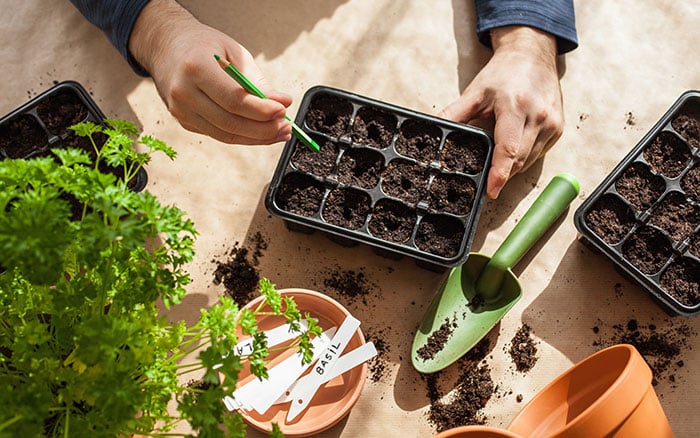Succession planting refers to staggering sowing of crops or by continuously sowing seeds to have an elongated harvest period. This maximises productivity to make the most out of the vegetable garden through growing season.
Succession planting can be planting the same crop at different times, to stagger harvest times. For example, sowing lettuce one week, then sowing another round of lettuce seeds two weeks later. It spreads out harvest time, so you have crops for a longer period of time. It could also be sowing one type of seeds, then once harvested, quickly following the crop with a different one.
Success in planting
During growing season, the goal is to make the most of the space you have to harvest crops to enjoy in the kitchen. Whether you’re growing in containers, raised beds, or a large allotment, succession planting ensures you maximise productivity.
Efficiently planting increases yields for the season because most crops tend to only need half of the season to germinate and mature. Therefore, there’s still time after to grow another round or two of certain crops.
Not only that but sowing continuously goes hand-in-hand with other benefits too. Growing continuously through the season, especially leafy foliage veg means there will be constant coverage of the soil.
This reduces the risk of weeds, whilst also protecting the area from weather erosion. Succession sowing can also act as a trial run for crops through the season for pests and diseases.
The earliest sowings will show if there are issues with the soil, location and conditions, which can be adapted for the following rounds of planting.

Top of the crops
Before getting started, plan which crops will follow the first – are you opting for the same crop at different times or a different veg to follow the harvest?
Salads, early potatoes, carrots, and French beans are all contenders to grow ready for harvesting early in the season to be followed by more.
Choose which veg to grow by working out how long their growing season is and either pairing them with a crop to follow, or ensuring there is enough room to sow another round the following week or two after.
For some crops, such as rocket, spinach, and broccoli, successional sowing increases success because they are prone to bolting. On the other hand, growing rounds of long-fruiting crops means there will be ample supply of quality veg well into autumn. This is beneficial for courgettes and cucumbers.
Some crops that have short growing seasons include beetroot, turnips, spring onions, kale, and Swiss chard to name a few. Therefore, these can be sown regularly for a continuous supply, especially when opting for cultivars that are fast to mature.

Prepare for planting
As well as maximising yield, succession planting also increases the likelihood of successful crops because it gives the chance to check for nutrient deficiencies in the soil and improve it before planting the next set of crops.
It’s important to prepare beds with organic matter to improve the soil structure and fertility. Well-rotted manure, leaf mould, or compost will help lighter soil to retain moisture and nutrients whilst improving drainage in heavier soils. If you’re short on space, you can grow in containers or planters like Performance Organics Peat Free Fruit & Veg Planter.
Once the first crops are harvested, check the area for weeds and remove any that have germinated, before raking the soil to break down any large clumps. The organic matter worked into the soil before initial planting means it’s not necessary to add more, but if the soil does need a boost of nutrients, this is the time to add it before sowing or planting the next round.

Leave A Comment